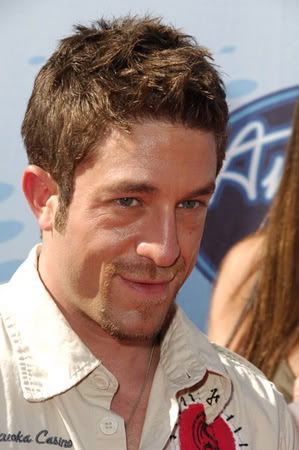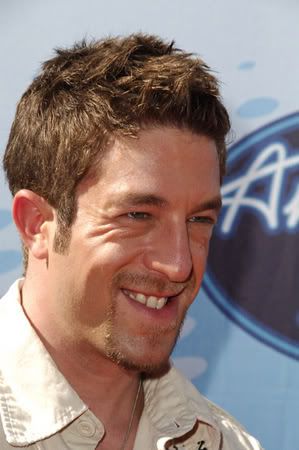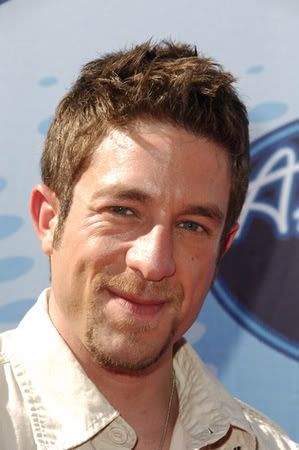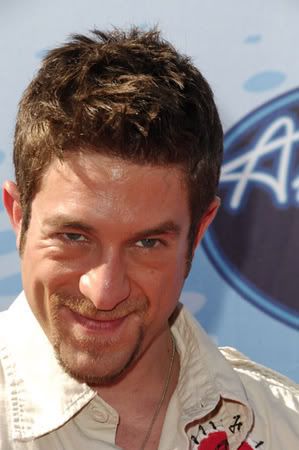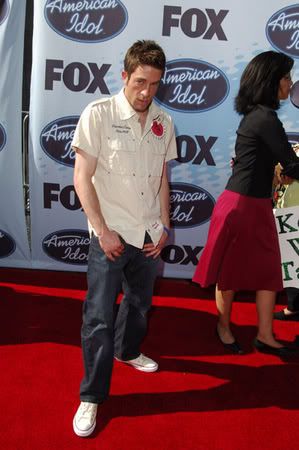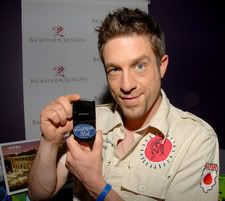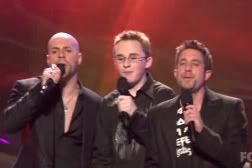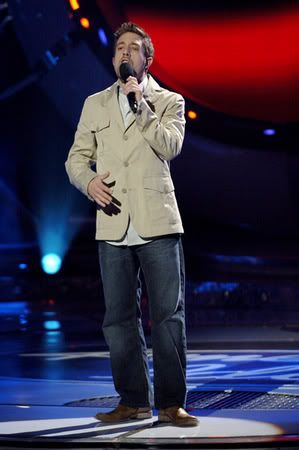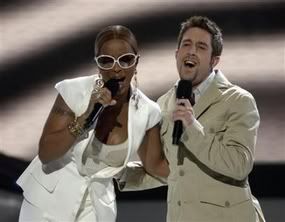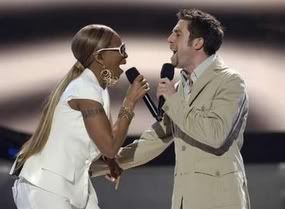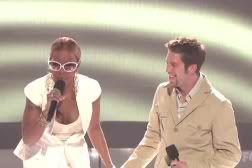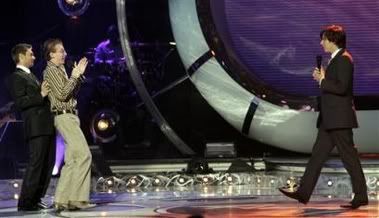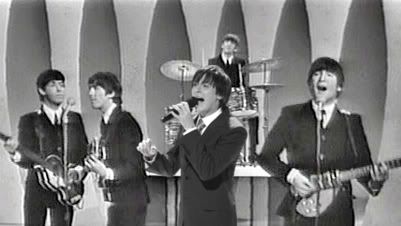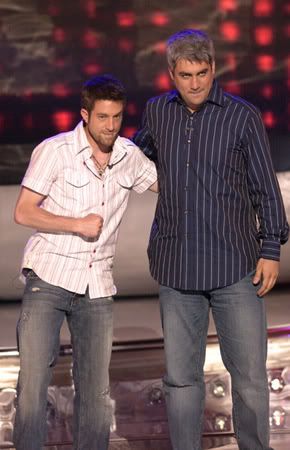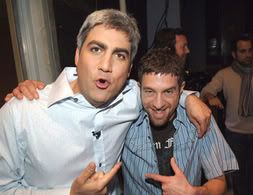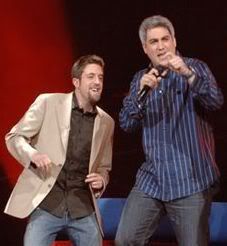Taylor Hicks has been crowned the 2006 winner of American Idol. The throwback reigned at the Kodak.
The best man left prevailed.
Elliott Yamin was my sentimental favorite – an underdog who motivated me to vote when the contestants still numbered in double digits. I saw greatness in Elliott’s talent and character but never dared to dream that he could outlast Mandisa Hundley, Ace Young, Kellie Pickler, Paris Bennett and Chris Daughtry. Taylor was my second favorite – and, as Elliott advanced, an increasingly distant second. When Elliott left, I forced myself to vote for Taylor – as if it were the bitterest medicine. Due to the expanded voting period and extra phone lines, I actually voted 30 minutes longer for Taylor than I ever had for Elliott. That felt just. Plain. Weird. But I knew then that I would be glad someday I did it – and I already am.
If your favorite was eliminated earlier in the competition, the lopsided showdown between Hicks and Katharine McPhee likely seemed anticlimactic. With so many strong vocalists in the top five, their sizable fan bases felt detached from the contest’s conclusion. Special guests and other surprises planned by the crew provided the only genuine drama in what was widely regarded as the most entertaining season finale in AI history.
As my husband was quick to remind me, he predicted Taylor’s ascendancy the first time we saw him in the auditions – exactly as he had done for Clay Aiken. Despite obvious disparities in style and appearance, Taylor and Clay have much in common within the context of American Idol. Both inspired the fierce devotion of followers who founded and populated large internet communities. Both incurred the chronic contempt of Simon Cowell who, in his myopic vision, could not foresee either as a singing star. Both received enough votes each week all the way through their respective seasons to keep them out of the group identified as the bottom two or three.
Although not the technical winner of season two, Clay was the first contestant to release an album – with the gracious permission of Ruben Studdard – and the contestant who earned the highest sales that year. Clay used his popularity as leverage to record a debut free of sexual content that he would be proud to let children hear. RCA, under the Sony/BMG umbrella, didn’t seem to appreciate Clay’s talent or understand how to present it. Measure of a Man was a good pop album – owing to Clay’s determination to select the most appropriate songs offered to him and vocals too strong for the studio Bandzilla to bury – but hardly the showcase he needed or deserved.
Like Clay, Taylor defied the odds and those who called him too odd to win. Taylor may face the same uphill battle for creative control, but he enjoys important advantages, including unusual sticktuitiveness. A decade ago, he dropped out of Auburn University to move to Nashville, where he began to chase his once elusive dream. When he told his father he was auditioning for American Idol, Brad Hicks said, "Why don't you just go buy a lottery ticket?" He is a songwriter-musician with an impeccable ear for his own sound and a steady eye for the right musical direction. His passionate reverence for soul, rock ‘n’ roll, rhythm & blues, and country honors the legacy of his forebears – and gives him broad appeal across a wider variety of genres and radio formats than any AI predecessor before him.
From the start I admired Taylor and expected him to win. He charmed me with his unembarrassed zeal for performing – the physical manifestation of his incorruptible faith in music. His victory was a vindication of his faith and his music, which overcame months of careless handling and cynical manipulations. After the AI producers forced Taylor to switch love songs at nearly the last minute, I noted that he looked wounded. In his new interview with Rolling Stone, he compared his AI experience to “dancing with the devil.” As Clay might attest, nothing exorcises demons like the triumphant success of an anti-idol.
Clay’s astonishing return to the program that launched his career was a highlight of the season five finale. Every tentative, deliberate step back onto the AI stage carried the weight of many milestones and millstones since his own anticlimactic exit three long years ago. Seeing his stylish new look and mature, confident demeanor was almost like meeting Clay again for the first time. As he took command of the microphone, his voice was instantly familiar and yet as thrilling as ever.
Artists who create and sustain such a potent connection are blessed with a special gift that cannot be manufactured by TV or recording industry moguls. Compelling performers like Clay and Taylor make the audience believe in the power of music to transcend and transform.
Taylor believes – with the wishful innocence of a child on Christmas morning. Taylor has the gift – and the conviction of a man who has long sacrificed for his art. You could say he waited a lifetime for a moment like this.
Wednesday, May 31, 2006
Thursday, May 25, 2006
Tuesday, May 23, 2006
May the Best Man Left Win
If you are a heartbroken Yaminion like me, you may be undecided about getting back on the phone tonight to vote for one of the American Idol finalists.
Ask yourself these questions. Which one has Elliott Yamin called his friend for life, Taylor Hicks or Katharine McPhee? By going out of his way to talk about how close they are in his exit interviews, was Elliott sending his fans a message to vote for Taylor? Would Elliott feel better about his own elimination if he knew his loyal fans helped his good buddy Taylor win?
You can see their mutual love and affection in this video of them joking around together during the filming of a Ford carmercial. Elliott is Taylor’s bro from a different schmo.
Do whatever you think is right.
Ask yourself these questions. Which one has Elliott Yamin called his friend for life, Taylor Hicks or Katharine McPhee? By going out of his way to talk about how close they are in his exit interviews, was Elliott sending his fans a message to vote for Taylor? Would Elliott feel better about his own elimination if he knew his loyal fans helped his good buddy Taylor win?
You can see their mutual love and affection in this video of them joking around together during the filming of a Ford carmercial. Elliott is Taylor’s bro from a different schmo.
Do whatever you think is right.
Sunday, May 21, 2006
Aim Higher – Vote for Taylor Hicks
Recently I attended a university graduation where Ken Blanchard, the author of business theory primers including One Minute Manager, was the keynote speaker. The message he tried to impart was simple and, as commencement addresses go, fairly succinct.
Dr. Blanchard described a boy he knew whose grandmother was a Monopoly whiz. Finally the day arrived when he was skilled enough to beat her at the game. As he exulted in his victory, Grandma told him gently, “That’s wonderful. But don’t forget – everything goes back in the box.”
Status and material success are the means to an end, he explained, but you cannot take them with you. Aim higher. Strive for significance.
This story may not seem relevant to American Idol, but it illustrates what I think is the show’s most frustrating flaw. A franchise that claims to create singing idols squanders its considerable power and resources to promote easy-to-market hit makers instead. AI could lead the revitalization of a music industry in flux instead of lagging behind pop culture on the decline. But the Idiots-in-Charge would rather milk the ailing cash cow – every time.
American Idol holds a unique position to produce instant stars, influence musical tastes and ignite purchasing trends. Having their work highlighted on the show can be an enormous boost to forgotten and unknown artists. Since Daniel Powter’s Bad Day became the soundtrack for each eliminated contestant’s video retrospective, the single came from musical oblivion to the top of Billboard’s Hot 100 chart. After Elliott Yamin paid his moving tribute to Donny Hathaway in word and song on April 25, 2006, A Donny Hathaway Collection zoomed up the ranks of Amazon music sales.
Multi-generational families across the United States and beyond are watching American Idol together, voting for their favorite contestants, attending AI concerts, buying CDs and other AI-related merchandise, and writing AI commentary on websites, blogs and message boards. Clearly the show feeds a hunger for music that is crafted artfully, arranged smartly and performed compellingly. But the finished product it delivers all too often is disposable pop fare, the aural equivalent of junk food.
I asked my son, a college student who listens to thrash metal and Japanese electronica, why he enjoys AI's featured music. He answered simply, "It's better than what's on the radio." His AI5 favorites have been Taylor Hicks and Paris Bennett.
The music industry and AM/FM radio are in a stagnant phase - due in part to technological advances including cheap and illegal downloads. No fresh genres have sprung from popular music since the ascendancy of alternative/indie, rap and hip-hop in the early 1990s. Ironically, alt rock's signature style has become as formulaic and mainstream as the so-called corporate rock that triggered its rebellious uprising 15 years ago.
Nevertheless, 2006 is the year that the AI brain trust caught up with the homogenized version of alternative and decided that the audience could handle an alt-ish idol. Chris Daughtry was the rocker who persuaded them. Actually, Chris is a talented singer-songwriter dedicated to a musical vision broader than the narrow niche AI chose for him. So was Bo Bice, last season's Southern rocker. These days Bo - or a defeated-looking impostor who resembles Bo - is on the top 10 charts with a single, The Real Thing, that sounds like a reject from Clay Aiken's Measure of a Man recording sessions.
If it weren't for hindsight, the AI team might be completely blind. Regrettably, they are also nearly deaf to most of the indigenous music that comprises the great American songbook - except for familiar tunes that became international hits or were covered by British artists. Nigel Lythgoe dismissing Try a Little Tenderness as a Blues Brothers number was just plain dumb. The fact that the creators and administrators of American Idol were born in the U.K. would not be a handicap if they honored their program's content - primarily 20th century American music - as much as its advertising dollars.
Well, they are about to receive the education of their lives - a crash course in music appreciation.
Throughout the AI5 season, I maintained news links and whatnot devoted to Taylor Hicks and Elliott Yamin down the sidebar of my blog. T-H-E-Y were my absolute favorites since their first televised auditions. As the competition progressed, I developed a consuming interest in one over the other.
When Elliott was eliminated last week, my heart left the building. After the initial stages of grieving, however, I found that I still have an interest in the outcome of AI5.
I pledge to vote non-stop this Tuesday for Taylor Hicks – and encourage other dispirited Yaminions to do the same. My dream that T-H-E-Y would appear together in the finale is lost. But I still believe that the winner should be someone who wants the victory for all the right reasons.
A vote for Taylor is more than a vote against Katharine McPhee. It is an affirmation of the soul, R&B, and blues that T-H-E-Y love. Elliott and Taylor entered this competition driven by a common passion to sing the music that is their life’s blood. Not for the perks of celebrity or success. Not in search of opportunities to star on the stage, on TV or in films.
T-H-E-Y inspire their fans to seek out and support the artists whose catalogs T-H-E-Y introduced to us on American Idol. Imagine their music-loving phenomenon spreading across the continent and around the world. I don’t know if Taylor Hicks can single-handedly revive the music industry or simply remind a careworn civilization of our uplifting musical heritage. But, with Elliott's help and our votes, he stands a fighting chance – and I can still dream.
If Taylor Hicks wins the American Idol title, he will be in a position of power and influence to change modern music for the better. And unlike some television, radio and recording executives, I believe Taylor will aim higher and strive for significance.
Dr. Blanchard described a boy he knew whose grandmother was a Monopoly whiz. Finally the day arrived when he was skilled enough to beat her at the game. As he exulted in his victory, Grandma told him gently, “That’s wonderful. But don’t forget – everything goes back in the box.”
Status and material success are the means to an end, he explained, but you cannot take them with you. Aim higher. Strive for significance.
This story may not seem relevant to American Idol, but it illustrates what I think is the show’s most frustrating flaw. A franchise that claims to create singing idols squanders its considerable power and resources to promote easy-to-market hit makers instead. AI could lead the revitalization of a music industry in flux instead of lagging behind pop culture on the decline. But the Idiots-in-Charge would rather milk the ailing cash cow – every time.
American Idol holds a unique position to produce instant stars, influence musical tastes and ignite purchasing trends. Having their work highlighted on the show can be an enormous boost to forgotten and unknown artists. Since Daniel Powter’s Bad Day became the soundtrack for each eliminated contestant’s video retrospective, the single came from musical oblivion to the top of Billboard’s Hot 100 chart. After Elliott Yamin paid his moving tribute to Donny Hathaway in word and song on April 25, 2006, A Donny Hathaway Collection zoomed up the ranks of Amazon music sales.
Multi-generational families across the United States and beyond are watching American Idol together, voting for their favorite contestants, attending AI concerts, buying CDs and other AI-related merchandise, and writing AI commentary on websites, blogs and message boards. Clearly the show feeds a hunger for music that is crafted artfully, arranged smartly and performed compellingly. But the finished product it delivers all too often is disposable pop fare, the aural equivalent of junk food.
I asked my son, a college student who listens to thrash metal and Japanese electronica, why he enjoys AI's featured music. He answered simply, "It's better than what's on the radio." His AI5 favorites have been Taylor Hicks and Paris Bennett.
The music industry and AM/FM radio are in a stagnant phase - due in part to technological advances including cheap and illegal downloads. No fresh genres have sprung from popular music since the ascendancy of alternative/indie, rap and hip-hop in the early 1990s. Ironically, alt rock's signature style has become as formulaic and mainstream as the so-called corporate rock that triggered its rebellious uprising 15 years ago.
Nevertheless, 2006 is the year that the AI brain trust caught up with the homogenized version of alternative and decided that the audience could handle an alt-ish idol. Chris Daughtry was the rocker who persuaded them. Actually, Chris is a talented singer-songwriter dedicated to a musical vision broader than the narrow niche AI chose for him. So was Bo Bice, last season's Southern rocker. These days Bo - or a defeated-looking impostor who resembles Bo - is on the top 10 charts with a single, The Real Thing, that sounds like a reject from Clay Aiken's Measure of a Man recording sessions.
If it weren't for hindsight, the AI team might be completely blind. Regrettably, they are also nearly deaf to most of the indigenous music that comprises the great American songbook - except for familiar tunes that became international hits or were covered by British artists. Nigel Lythgoe dismissing Try a Little Tenderness as a Blues Brothers number was just plain dumb. The fact that the creators and administrators of American Idol were born in the U.K. would not be a handicap if they honored their program's content - primarily 20th century American music - as much as its advertising dollars.
Well, they are about to receive the education of their lives - a crash course in music appreciation.
Throughout the AI5 season, I maintained news links and whatnot devoted to Taylor Hicks and Elliott Yamin down the sidebar of my blog. T-H-E-Y were my absolute favorites since their first televised auditions. As the competition progressed, I developed a consuming interest in one over the other.
When Elliott was eliminated last week, my heart left the building. After the initial stages of grieving, however, I found that I still have an interest in the outcome of AI5.
I pledge to vote non-stop this Tuesday for Taylor Hicks – and encourage other dispirited Yaminions to do the same. My dream that T-H-E-Y would appear together in the finale is lost. But I still believe that the winner should be someone who wants the victory for all the right reasons.
A vote for Taylor is more than a vote against Katharine McPhee. It is an affirmation of the soul, R&B, and blues that T-H-E-Y love. Elliott and Taylor entered this competition driven by a common passion to sing the music that is their life’s blood. Not for the perks of celebrity or success. Not in search of opportunities to star on the stage, on TV or in films.
T-H-E-Y inspire their fans to seek out and support the artists whose catalogs T-H-E-Y introduced to us on American Idol. Imagine their music-loving phenomenon spreading across the continent and around the world. I don’t know if Taylor Hicks can single-handedly revive the music industry or simply remind a careworn civilization of our uplifting musical heritage. But, with Elliott's help and our votes, he stands a fighting chance – and I can still dream.
If Taylor Hicks wins the American Idol title, he will be in a position of power and influence to change modern music for the better. And unlike some television, radio and recording executives, I believe Taylor will aim higher and strive for significance.
Subscribe to:
Posts (Atom)

